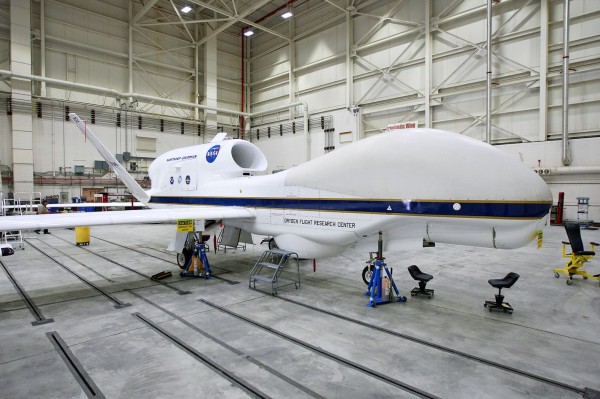《TAIPEI TIMES 焦點》 US outlines new policy for exports of armed drones

A NASA Global Hawk Unmanned Aircraft System is seen on May 20, 2014 on Edwards Air Force Base, California. Photo: AFP
/ Reuters, WASHINGTON
The US government on Tuesday established a policy for exports of military and commercial drones, including armed ones, and said it plans to work with other countries to shape global standards for the use of the controversial weapons systems.
The US Department of State said it would allow exports of lethal US military drones under strict conditions, including that sales must be made through government programs and that recipient nations must agree to certain “end-use assurances.”
The policy, the details of which are classified, comes after a two-year review amid growing demand from US allies for the new breed of weapons that have played a key role in US military action in Afghanistan, Iraq and Yemen.
It could help US companies boost sales of military and commercial drones in an increasingly competitive global market.
Privately held General Atomics, maker of the Predator and Reaper drones, Northrop Grumman Corp, Textron and other arms makers have been urging Washington for years to loosen strict export curbs, which they say have caused them to lose orders to Israel and others in the growing market.
Ideally, the policy would help industry better understand the current complex review process for drone exports, said Remy Nathan, vice president of the Aerospace Industries Association.
He said the association had asked for a classified briefing on the policy.
The shift came just days after US aviation regulators proposed rules that would lift some restrictions on drone use for commercial purposes, but would still limit activities such as inspections of pipelines.
The change also follows stern warnings by top US officials about rapid advances in weapons technology by China, Russia and other potential foes, including unmanned systems.
China has its own ambitious drone program and has exported drones to at least nine countries, including Pakistan, Egypt and the United Arab Emirates, while it is also in talks with Saudi Arabia and Algeria for sales, according to Chinese state media.
The new policy will make it easier for the US’ closest allies to buy armed drones, while maintaining stringent controls on the overall technology, US officials said.
Britain is the only country now flying armed US drones, but France and Italy fly Reaper surveillance drones.
A State Department official said that previous requests for armed drones from Italy and Turkey would be reviewed in light of the new policy.
The policy maintains “a strong presumption of denial” of sales of the biggest drones, so-called Category I aircraft that have a range of at least 300km and can carry a payload of at least 500kg, but will allow such exports on “rare occasions.”
The official said there was no formal list of countries that would be eligible for exports of armed drones, and all requests would be evaluated on a case-by-case basis, with consideration of human rights, regional power balance and other factors.
The Philippines, which is embroiled in a bitter dispute with China over South China Sea boundaries, would be interested in drones that could be used for intelligence and surveillance operations, military spokesman Colonel Restituto Padilla said.
It did not want armed drones, he added.
Sales of armed drones could boost Lockheed Martin Corp, which builds Hellfire missiles that are used by Predator and Reaper drones, but could also help companies like L-3 Communications Holdings and Raytheon Co, which build sensors and simulators for the unmanned systems.
“The new policy ensures appropriate participation for US industry in the emerging commercial UAS market, which will contribute to the health of the US industrial base, and thus to US national security, which includes economic security,” the State Department official said.
Under the policy, buyers of military drones will have to agree to strict conditions, including adherence to international law, and a ban on using the drones for unlawful surveillance or to crack down on their domestic populations.
新聞來源:TAIPEI TIMES



















